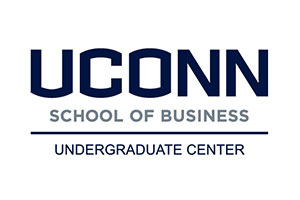What’s the key to staying competitive in a quickly changing job market?
 Build a strong skill set, distinguish yourself from your peers, and be a productive, likeable, and forward-thinking employee, said Melinda Brown, ’77, ’85 MBA.
Build a strong skill set, distinguish yourself from your peers, and be a productive, likeable, and forward-thinking employee, said Melinda Brown, ’77, ’85 MBA.
Brown, the senior vice president and corporate controller of Coach Inc., a $5 billion company, directed her remarks to UConn’s graduate business students during an alumni-student networking event Aug. 21 at the Society Room in Hartford.
Brown earned her Bachelor of Science in Accounting from the School of Business in 1977 and her MBA from UConn in 1985. She is on the Board of Directors for the UConn Foundation, and in 2012 was inducted into the School of Business Hall of Fame. After 29 years as a top executive with PepsiCo, she joined Coach two years ago.
Since she earned her MBA, Brown said, the world has accelerated at a rapid rate. While functional excellence is still important, today it is vital to spot converging trends, she said. To her parents, owning a microwave and TV was innovation. For today’s students she predicts they will someday be vacationing off the Earth.
“Today everything is feasible, everything is one moment away,” she said. “The next innovation is right around the corner.”
She urged the students to take advantage of every opportunity as they pursue their degrees.
“You can’t afford to come here to punch your ‘MBA ticket’ and become functionally literate and grab your diploma. This is a journey to learn both facts and ways of thinking and operating and well, frankly, about how to confront what you can’t even yet articulate. Those are the areas to explore, to dig into.
“The things that scare you the most are often the most rewarding. Develop your frameworks and paradigms, focus on creativity, EQ, collaboration and leadership—stretch yourself in ways you may have not previously contemplated. This is a safe place to practice being the next version and the next version and the next version of you.”
More than ever, organizations are seeking “design thinkers,” who can identify problems at their root cause. These are the people who will make the world a different place.
“I have one cell phone, two iPads and two computers. But if you asked me when I purchased my first Gateway computer in 1995, I would have told you that I thought it would be doubtful that any home needed more than one computer, let alone one person having multiple personal devices. The designers of all my mobile devices uncovered what I really needed, not what I told them I thought I needed. Henry Ford got it right—he said, “If I asked my customer what he wanted, he would have said, ‘A faster horse.'”
As her remarks drew to a close, she told the 150 graduate students that their future was certain to be exciting—and unprecedented.
“I know you’re going to get a wonderful education,” she told the students, “and I hope you’re ready for exponential times.”
Pictured: Mario Flores of New Britain, Alia Mahmood of North Haven, and Nicole Segretta of Bristol, all graduate business students at the University of Connecticut School of Business, speak with John A. Elliott, dean of the School of Business, and Melinda Brown, senior vice president and corporate controller at Coach Inc., during a student-alumni networking event on August 21 at the Society Room in Hartford.




